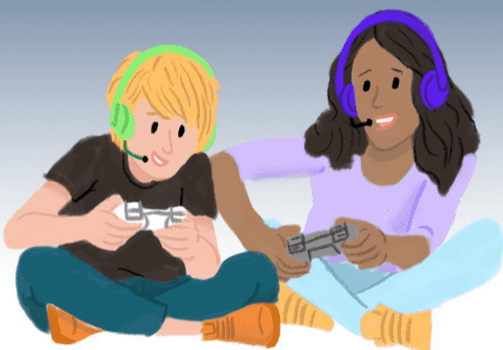This post originally appeared on the Digital Futures Commission website and appears here with permission.

Like everything else in their life, children’s play has shifted online almost by default due to the COVID-19 pandemic. Parents, teachers and professionals who work with children, on the other hand, have scrambled to advise children on play with digital technologies; resources have been hard to come by, making it hard to figure out what free play in digital contexts looks like! So, what are the important qualities of free play and how can these qualities be designed into digital contexts?
The Digital Futures Commission has taken an innovative approach to answer this question, combining two research reviews – The Panorama of Play and The Kaleidoscope of Play – and a public consultation on play. The consultation involved talking to lots of children and young people, aged 3 to 18, and listening to what they want to improve. Our initial research had helped to identify eight qualities of play, with the consultation helping to add a further four. Here are the Digital Futures Commission’s 12 qualities of free play:
- Intrinsically motivated
- Voluntary
- Open-ended
- Imaginative
- Stimulating
- Emotionally resonant
- Social
- Diverse
- Risk-taking
- Safety
- Sense of achievement
- Immersive
Our public consultation shows that children have naturally sought new ways of playing during the pandemic, and parents have supported them, for example by experimenting with playing on Zoom. Children’s accounts of their play with digital technologies show that they recognize both the positive and negative aspects of the digital environment in relation to their fun.
“I mainly use … things like game on Steam mainly, things like Slime Rancher. It’s a world where you have infinite possibilities to do whatever you … You are not controlled by a set of rules.”
Girl, 14
“Minecraft would be a good example. In that game, you can basically do whatever you want because you just download the mods for … what you’d like…so you’re not really following a script.”
Boy, 16
Children found commercial pressures (e.g. loot boxes) problematic.
“My mum…blocked the chat…just in case some people say mean things…[but] there are Rubux…it’s not good because they’re kind of tempting to buy.”
Girl, 12
Parents found some digital platforms, such as Zoom, rather restrictive of social and emotional experience and undermining possibilities for immersion and children’s intrinsic motivation to play, especially for young children.
“My child often gets quite hurt by things that happen on Zoom … I find it really problematic mainly because the kids aren’t moving their bodies; they’re not experiencing enough of the 360-degree experience.”
Mother
Yet, the public discourse about play with digital technologies is still dominated by fear and addiction, as if children have lost touch with reality and parents have lost control of screen time.
It’s time for our society to stop blaming children and parents for circumstances beyond their control, start valuing their efforts and step up to make sure that the digital world is playful by design, to meet children’s needs and respect their rights.
The Digital Futures Commission calls on the public, especially those providers, designers, and policymakers with the power to redesign the digital environment, to prioritize the important qualities of free play. If it helps to think about the joy of free play back in the day, then do so! What matters is both to address the problems that hinder children’s digital opportunities and also to facilitate these proactively.
What children told us about their play experience in digital contexts explains why we add to the existing calls for safety by design and privacy by design – an exciting new call for Playful by Design!
This is just the beginning of the Commission’s work on Playful by Design – the full findings will be published in the autumn. But as the summer holidays start, we invite the public to think ambitiously for children’s play in a digital world, and to make sure it’s child-led and fun.
You can download Playful by Design here.
 Sonia Livingstone DPhil (Oxon), FBA, FBPS, FAcSS, FRSA, OBE is a professor in the Department of Media and Communications at the London School of Economics and Political Science. She is the author of 20 books on children’s online opportunities and risks, including “The Class: Living and Learning in the Digital Age”. Sonia has advised the UK government, European Commission, European Parliament, Council of Europe, and other national and international organisations on children’s rights, risks, and safety in the digital age.
Sonia Livingstone DPhil (Oxon), FBA, FBPS, FAcSS, FRSA, OBE is a professor in the Department of Media and Communications at the London School of Economics and Political Science. She is the author of 20 books on children’s online opportunities and risks, including “The Class: Living and Learning in the Digital Age”. Sonia has advised the UK government, European Commission, European Parliament, Council of Europe, and other national and international organisations on children’s rights, risks, and safety in the digital age.
 Dr. Kruakae Pothong is a Researcher at 5Rights and visiting research fellow in the Department of Media and Communications at London School of Economics and Political Science. Her research spans the areas of human-computer interaction, digital ethics, data protection, internet, and other related policies. She specializes in designing social-technical research, using deliberative methods to elicit human values and expectations of technological advances, such as the Internet of Things (IoT) and distributed ledgers.
Dr. Kruakae Pothong is a Researcher at 5Rights and visiting research fellow in the Department of Media and Communications at London School of Economics and Political Science. Her research spans the areas of human-computer interaction, digital ethics, data protection, internet, and other related policies. She specializes in designing social-technical research, using deliberative methods to elicit human values and expectations of technological advances, such as the Internet of Things (IoT) and distributed ledgers.


